
“She Is Big Mad”: SIL Won’t Shut Up About Family’s Eating Habits, Is Put In Her Place
Proper nutrition is important for everyone, but especially for young kids as they grow and develop. The big question, though, is what does “eating healthy” really look like?
For one dad on Reddit, feeding his two children frequent, small meals throughout the day works just fine. But his sister-in-law disagrees. She believes that kids should eat three strict meals a day, no exceptions. This difference of opinion has led to some fiery arguments between the two. Read on to find out how they’re handling their family feud.
The way this stay-at-home dad has been handling his children’s meals has caused quite a stir with his sister-in-law
Image credits: Picsea / unsplash (not the actual photo)
“AITA for telling my SIL to practice keeping her opinions to herself because she doesn’t get a say in how my kids eat?”
“I’m (30M) a stay-at-home dad. My wife (29F) and I have two kids together. Our oldest is 4 and our youngest is 18 months. I became the stay-at-home parent when our oldest was born. My brother (36M) is married to SIL (39F) and they have five kids together between the ages of 4 and 10. SIL was “stunned” when I became the stay-at-home parent vs my wife.
She has a more “traditional” view of marriage and family and believes the mom is more important in the home than the dad and that the dad is more important as the provider. Stunned and traditional are her choice of words, just so you’re aware.
Image credits: Antoni Shkraba / pexels (not the actual photo)
So I always felt like she was more critical of me as a parent. Maybe not in clear ways before now but her attitude made me feel like she was watching closely to see if I was good enough.
The way my wife and I feed our kids is different to how my SIL and my brother feed their kids. SIL believes in 3 meals a day no matter what the age and nothing more or less. She believes that is the way it has been done for centuries and it works. My wife and I approach it differently.
We feed the kids smaller, more frequent meals and snacks. Because of this, I carry around lunch boxes for both my kids that have foods they eat throughout the day if we go anywhere. And at home my wife or I have stuff pre-made and ready to go. This means my kids eat little meals or snacks every three-ish hours. Not large quantities but smaller and more frequently than my nieces and nephews.
Image credits: Tanaphong Toochinda / unspalsh (not the actual photo)
SIL thinks it’s “insanity” and she has told me I make more work for myself and claims I’m trying to “be different because I’m a dad doing the primary caregiving”. She told me I should practice doing things differently because in the real world this stuff won’t work and preschool and school won’t allow for this, which isn’t true with where we have chosen to send our kids to school.
But she doesn’t want to hear that. I spoke to my brother about his wife’s comments on the choices my wife and I made to feed our kids and how it’s not helpful or needed. He said he knows but that it’s just how she is. I told him if she keeps it up she will be told to shut up, maybe or maybe not in a nicer way. He just shrugged.
I hit this limit on Friday when SIL saw me out with the kids and my dad and FIL (the three of us grocery shop together some Fridays). She brought it up out of nowhere because she saw the bag I keep the lunch boxes in. She didn’t even see them eat anything but needed to say something.
She told me I should practice better eating habits and I told her she should practice keeping her opinions to herself because she doesn’t get a say in how my kids eat and she doesn’t get to open her big mouth about it every time she sees me now. She stormed off outraged and there have been multiple texts from her and my brother since. He’s mostly just telling me what she’s saying but she is big mad.
AITA?”
Credit: Even-Refuse-7613
Children who develop healthy eating habits are more likely to grow into healthy adults
According to the American Heart Association, kids who eat well tend to adopt lifelong healthy behaviors and have a lower risk of obesity and heart disease. But that doesn’t mean being overly strict about managing their food, as the sister-in-law in the Reddit story suggests.
In fact, imposing rigid rules around eating might work in the short term, but it often creates more lasting negative effects. This can hinder a child’s ability to develop positive decision-making skills and can reduce their sense of control—both important parts of a child’s growth.
Research also shows it can trigger habits like eating out of boredom, gravitating towards high-calorie foods, and a higher chance of struggling with eating disorders. That said, letting children eat whatever they want all the time isn’t ideal either—what really matters is helping them build a healthy relationship with food.
Image credits: Ron Lach / pexels (not the actual photo)
The American Academy of Pediatrics recommends that toddlers consume around 1,000 to 1,400 calories a day, divided between three meals and two healthy snacks. As they grow older, their calorie requirements increase. And since kids have smaller stomachs than adults, their portions don’t need to be large. For example, a typical toddler meal might include an ounce of meat, a few tablespoons of vegetables and fruit, and a small piece of bread.
The best way for kids to maintain a balanced diet is through responsive feeding, explains Dipti Dev, associate professor and child health behavior specialist at the University of Nebraska–Lincoln. This approach involves paying close attention to hunger cues. If a child seems full, you might ask them, “Are you full?” rather than “Are you done?” This encourages them to reflect on their hunger rather than just finishing what’s on their plate.
“Responsive feeding can be as simple as changing the way people present the food to the children,” Dev says. For instance, offering dessert only after they’ve eaten fruits and vegetables can cause them to view the healthier options negatively. Instead, treating all foods equally helps prevent children from resenting fruits and vegetables, making mealtime less of a struggle.
Setting a good example as an adult is also crucial. “Children are influenced by adults, especially at a young age, so childcare providers, parents, grandparents, and teachers can all serve as role models for healthy eating,” Dev says.
Moreover, adults can make mealtime fun by offering a variety of foods and using playful descriptions like “crunchy” or “juicy.” When kids see this, they’re more open to giving new things a taste. “Children are naturally curious, and they want to explore,” Dev adds. “Allowing them to explore new, healthy foods will expose them to different options and find what they like.”
The goal is to make eating a joyful and rewarding experience, not something children forced to endure.
The comments were full of support for the dad, along with some advice on how to manage his sister-in-law
Poll Question
Thanks! Check out the results:
Given the title, I initially thought he was feeding them less than 3 meals, but there is nothing wrong with feeding them smaller meals more often. It's probably healthier, but even if it isn't (I think it is), SIL's comments are not just unnecessary, but rude. Shut her down swiftly and brutally next time she speaks
The pattern this Dad is choosing for his children is totally in line with the NHS advice for children aged between 1 and 4 years of age: "You should offer your child three meals and two/three healthy snacks each day," https://www.wwl.nhs.uk/media/.leaflets/66029cb4b4b781.74646237.pdf
Exactly, and most of us do the same as adults. Breakfast, morning tea, lunch, mid afternoon snack, dinner and even snacking as supper. It does lead to smaller main meals and it means you get in a piece of fruit or some veg and hummus in your day.
Load More Replies...Given the title, I initially thought he was feeding them less than 3 meals, but there is nothing wrong with feeding them smaller meals more often. It's probably healthier, but even if it isn't (I think it is), SIL's comments are not just unnecessary, but rude. Shut her down swiftly and brutally next time she speaks
The pattern this Dad is choosing for his children is totally in line with the NHS advice for children aged between 1 and 4 years of age: "You should offer your child three meals and two/three healthy snacks each day," https://www.wwl.nhs.uk/media/.leaflets/66029cb4b4b781.74646237.pdf
Exactly, and most of us do the same as adults. Breakfast, morning tea, lunch, mid afternoon snack, dinner and even snacking as supper. It does lead to smaller main meals and it means you get in a piece of fruit or some veg and hummus in your day.
Load More Replies...
 Dark Mode
Dark Mode 

 No fees, cancel anytime
No fees, cancel anytime 






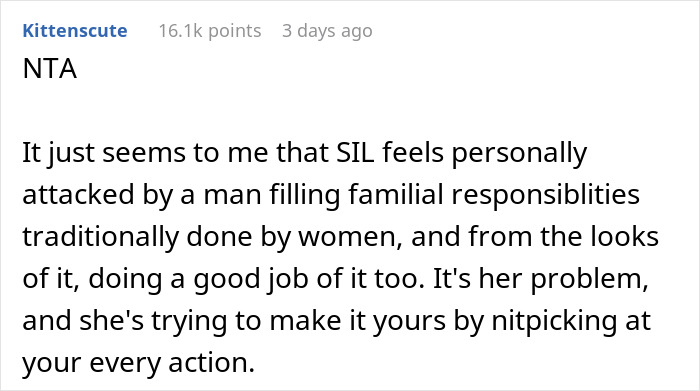
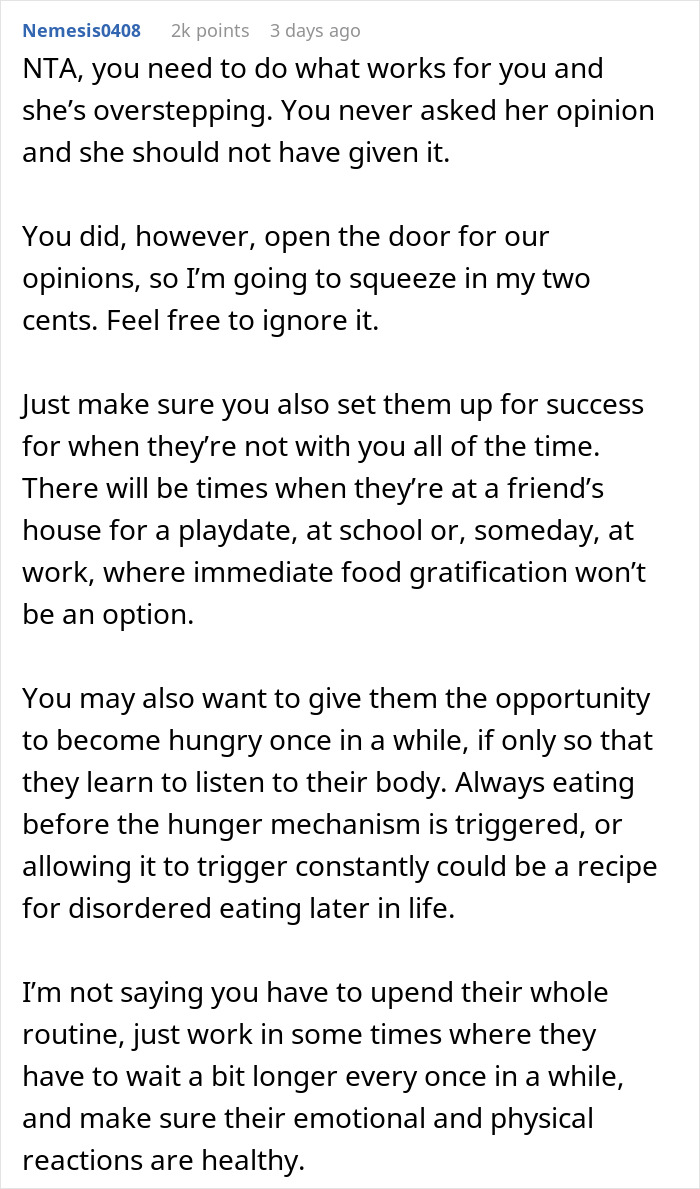
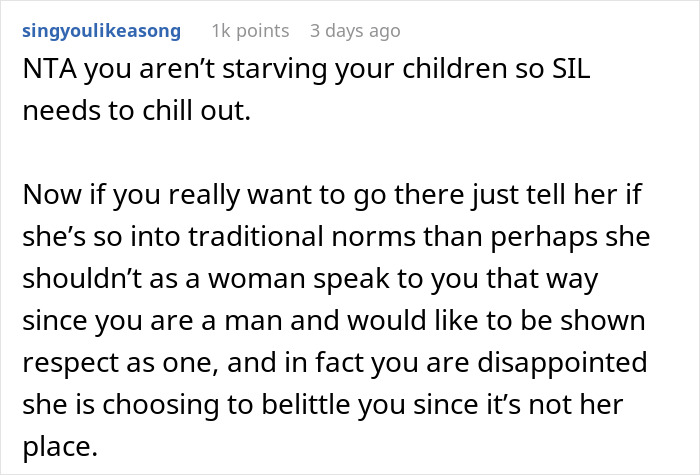
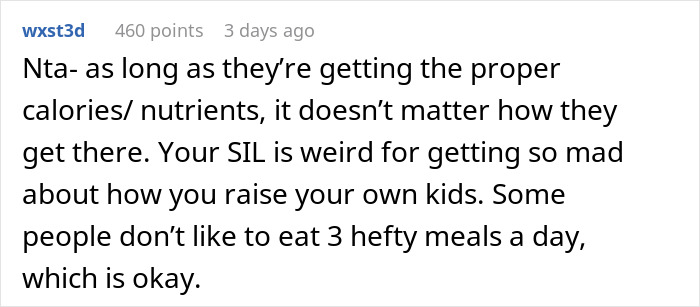
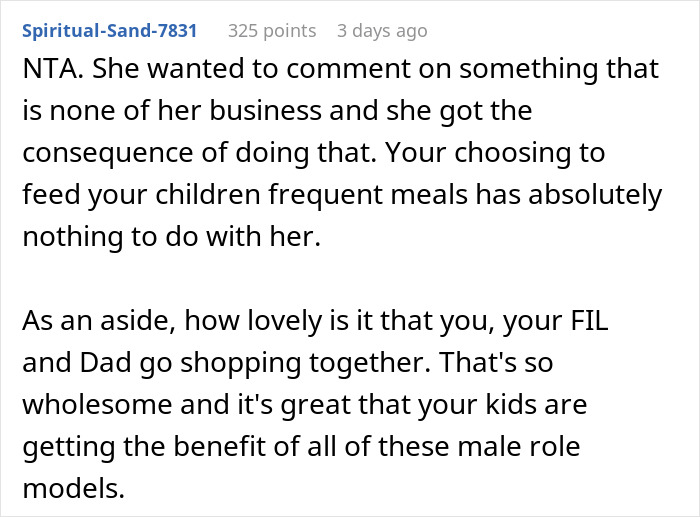
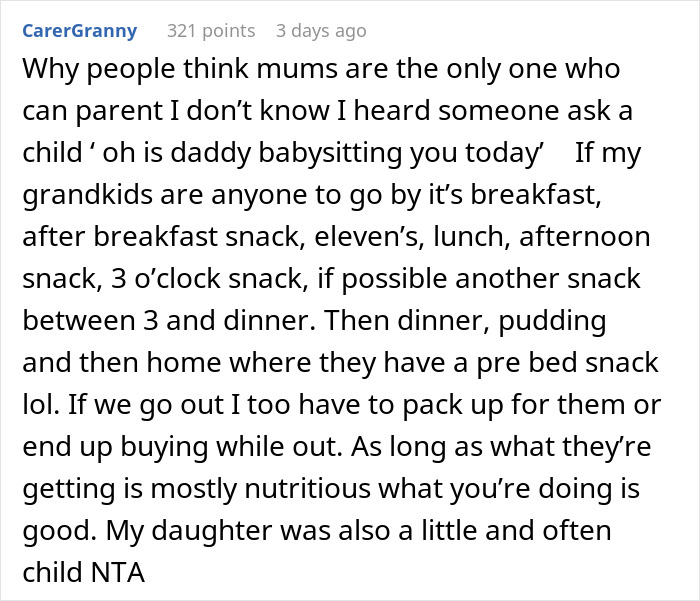



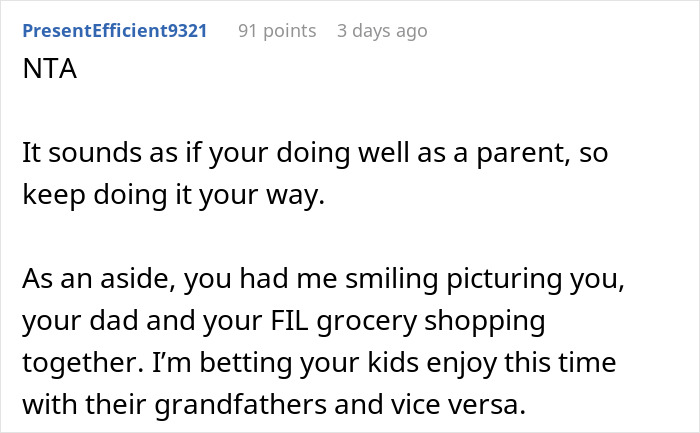





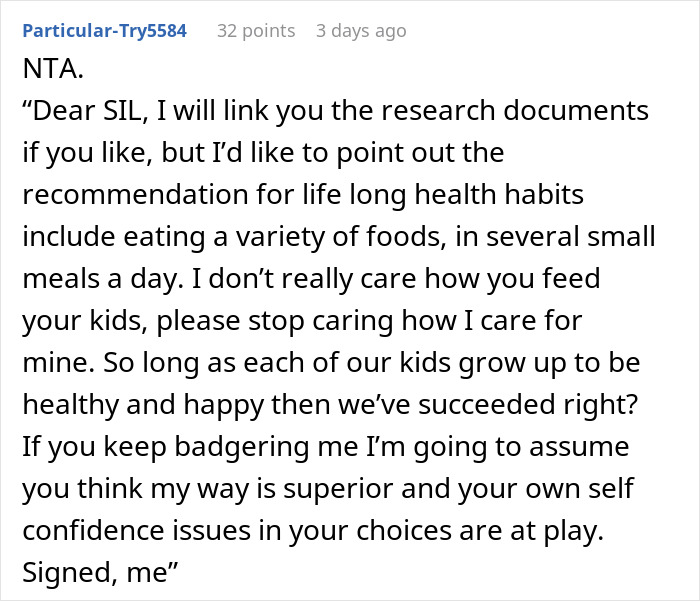
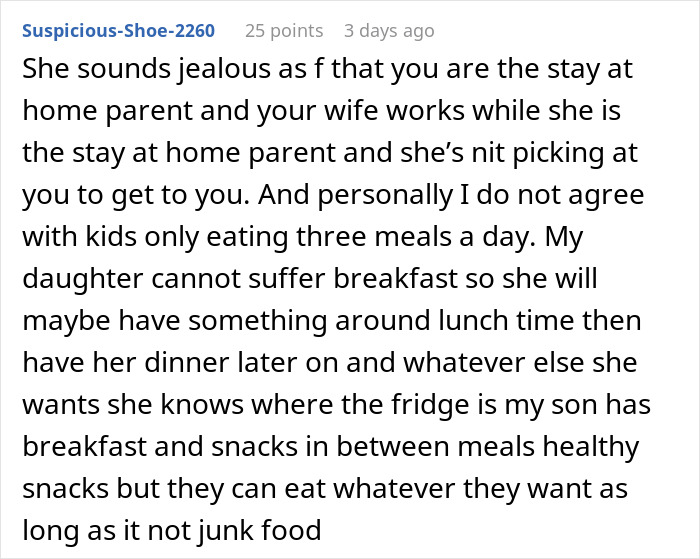







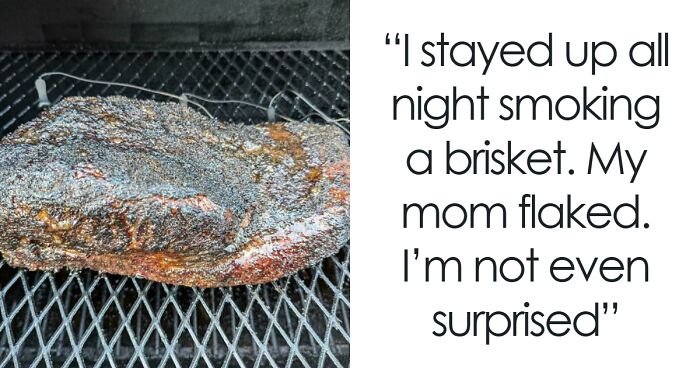






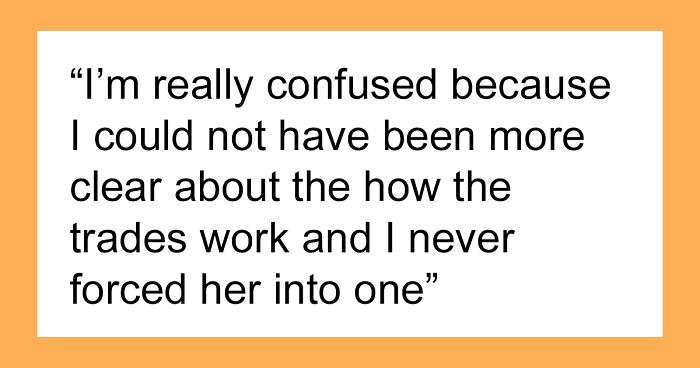
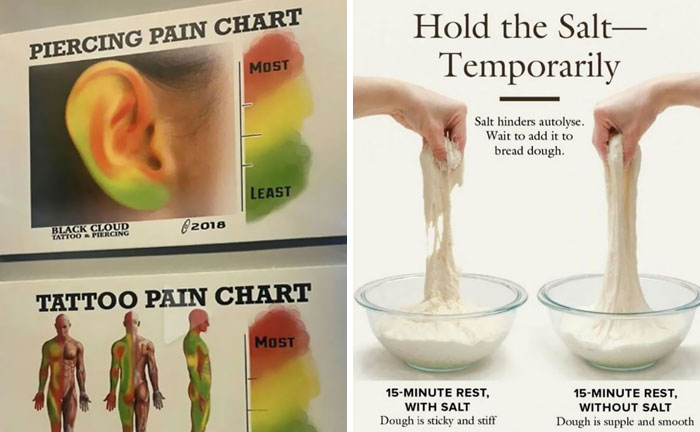






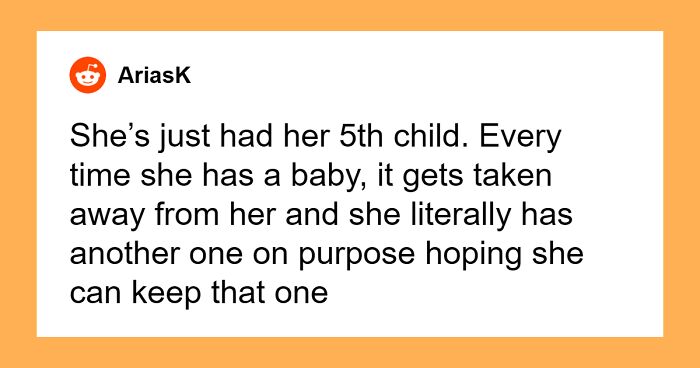




30
36